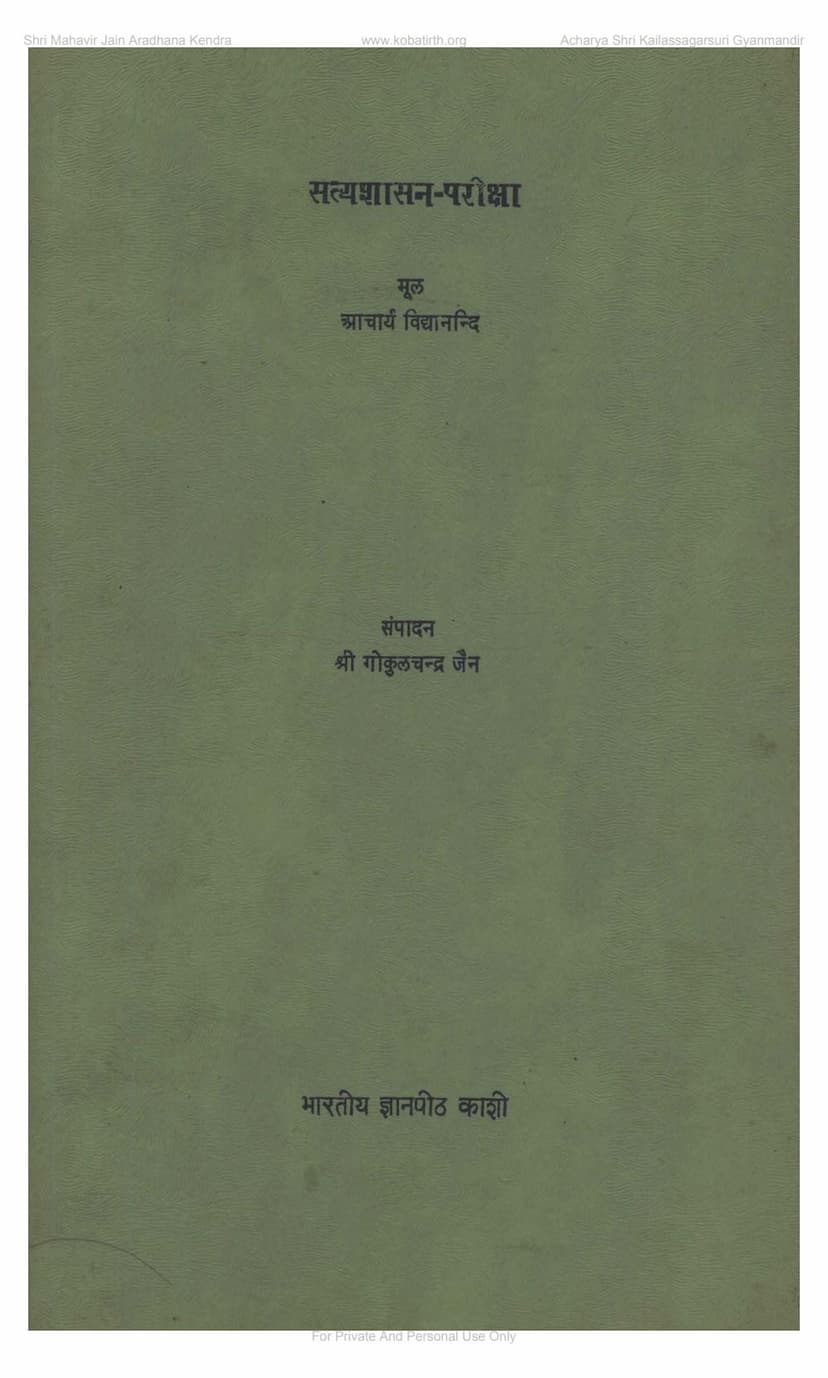Satyashasan Pariksha
Added to library: September 2, 2025

Summary
Here's a comprehensive summary of the Jain text "Satyashasan Pariksha" by Acharya Vidyanandi, based on the provided pages:
Book Title: Satyashasan Pariksha (सत्यशासन-परीक्षा) Author: Acharya Vidyanandi (आचार्य विद्यानन्दि) Editor: Gokulchandra Jain (श्री गोकुलचन्द्र जैन) Publisher: Bharatiya Gyanpith (भारतीय ज्ञानपीठ) Series: Murtidevi Jain Granthamala, Sanskrit Granthanka - 30 Publication Year: Vira Nirvana Samvat 2490 / Vikrama Samvat 2020 / 1964 AD
Overall Purpose:
"Satyashasan Pariksha" (Examination of True Doctrines) is a significant work of Jain philosophy and logic. Acharya Vidyanandi critically examines various philosophical schools prevalent in his time, evaluating their doctrines against the criteria of truth, primarily drsteṣṭaviruddhatva (being non-contradictory to perception and inference). The ultimate aim is to establish the truth of the Jain perspective, particularly its anekanta (non-one-sidedness) doctrine.
Author and Context:
Acharya Vidyanandi is presented as a prominent Jain logician and philosopher, considered an intellectual successor to the great Acharya Akalanka. His era is estimated to be between 775 and 840 AD, a period of intense philosophical debate in India. Vidyanandi's work builds upon the logical tradition established by Samantabhadra, Akalanka, and others, and he engages rigorously with the philosophical arguments of Vedic, Buddhist, and other contemporary schools.
Structure and Content:
The book is structured as an examination (pariksha) of various "shasanas" (doctrines or schools of thought). The core methodology involves presenting the purvapaksha (opponent's view) with supporting quotes from their foundational texts, followed by the uttapaksha (Jain response/refutation), demonstrating the flaws and contradictions in the opponent's position and establishing the superiority of the Jain viewpoint.
The book critically examines the following fourteen schools or doctrines:
- Purushadvaita Shasana: Monism of the Absolute Being (often associated with Advaita Vedanta).
- Shabdadvaita Shasana: Monism of Sound/Word.
- Vijnanadvaita Shasana: Monism of Consciousness (associated with Yogacara Buddhism).
- Chitrādvaita Shasana: A doctrine likely related to the subjective idealism of Buddhism, possibly referring to the phenomenal aspect of consciousness.
- Chārvāka Shasana: Materialism, which denies the soul, afterlife, and omniscience, and accepts only perception as valid knowledge.
- Bauddha Shasana: Buddhism, which in its various forms (Sautrantika, Yogachara) is analyzed. Key Buddhist concepts like kshana-bhanga (momentariness), anatman (no-soul), and shunyata (emptiness) are challenged.
- Sesvara Sankhya: Theistic Sankhya, which posits Prakriti and Purusha as fundamental principles and discusses evolution.
- Nirisvara Sankhya: Atheistic Sankhya, with similar core tenets but without a divine creator.
- Nyayika Shasana: The Nyaya school, focusing on its epistemology (pramana) and concepts of liberation.
- Vaisheshika Shasana: The Vaisheshika school, with its categories (dravya, guna, karma, etc.), the concept of samavāya (inherence), and its view of God and liberation.
- Bhatta Shasana: The Bhatta Mīmāmsā school.
- Prabhakara Shasana: The Prabhakara Mīmāmsā school.
- Tattvopaplava Shasana: Skepticism or the doctrine of the collapse of all principles.
- Anekanta Shasana: The Jain doctrine of non-one-sidedness, presented as the true doctrine.
Key Arguments and Themes:
- Critique of Monism (Advaita): Vidyanandi argues that absolute monism contradicts direct perception, which reveals a world of distinctions. He refutes arguments based on dream experiences and the concept of avidya (nescience) as the cause of plurality.
- Refutation of Subjectivism/Idealism (Vijnanadvaita): Vidyanandi criticizes the Buddhist claim that only consciousness is real and external objects are mere illusions. He highlights the self-contradiction in denying all instruments of knowledge while using them to prove his point.
- Challenging Materialism (Charvaka): Vidyanandi defends the existence of the soul, past lives, and omniscience against the Charvaka denial, using arguments based on causality, self-awareness, and the testimony of virtuous individuals and scriptures.
- Analyzing Buddhist Fluxism (Sautrantika): The doctrine of momentariness and the absence of a permanent self are challenged by the Jain concept of continuity and the reality of composite wholes. Vidyanandi emphasizes the problems of causality in a constantly perishing reality.
- Critique of Sankhya: Vidyanandi questions the eternal and all-pervasive nature of Prakriti and the evolution process, highlighting contradictions and the inability to explain manifestation through such a system.
- Debates with Vaisheshika and Nyaya: The concept of samavaya (inherence) is rigorously analyzed and criticized for its logical inconsistencies and reliance on unproven assumptions. The argument for an Intelligent Creator (God) is also refuted from a Jain perspective, often highlighting the flaws in the reasoning or proposing alternative explanations like karman.
- Mīmāmsā Critique: The concept of eternal, universal, and partless categories in Mīmāmsā is challenged as contradictory to experience.
- The Supremacy of Anekanta: Throughout the work, Vidyanandi consistently demonstrates that only the Jain doctrine of anekanta (non-one-sidedness) and syadvada (conditional predication) can account for the complexities of reality as experienced and logically analyzed, without falling into contradictions or denying valid means of knowledge.
Editorial and Scholarly Contributions:
The edition by Gokulchandra Jain is noted for being the first critical edition of this work. The text is based on several manuscripts, with careful collation and variant readings provided. The publication also includes a Hindi introduction and appendices, making the complex philosophical arguments more accessible. The presence of an English compendium by Dr. Nathmal Tatia further enhances the book's value for a wider audience. The editorial notes and the detailed table of contents provide a clear roadmap through Vidyanandi's extensive refutations.
Significance:
"Satyashasan Pariksha" is a cornerstone of Jain epistemology and dialectics. It showcases Acharya Vidyanandi's profound understanding of Indian philosophical systems and his mastery of logical argumentation. The work is crucial for understanding the Jain engagement with other Indian philosophical traditions and for appreciating the depth and analytical rigor of Jain logic. The fact that it was published by Bharatiya Gyanpith, a renowned institution for the promotion of Indian knowledge systems, underscores its importance.